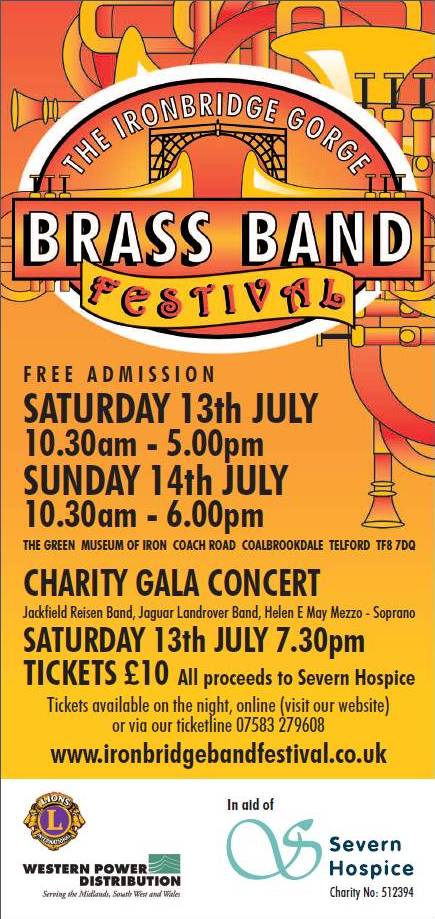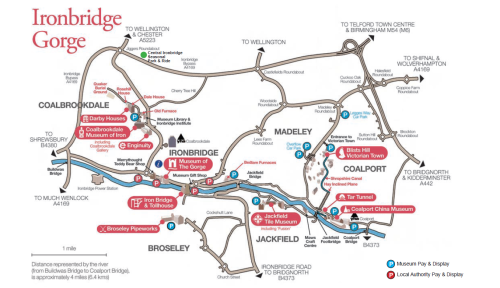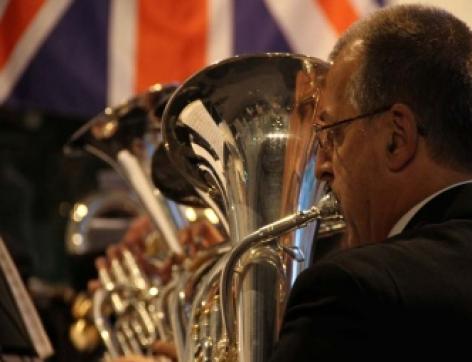Delegate Information: Coach Timetables
During the conference complimentary coaches will be available for delegates at various times at the start and finish of each day. A full timetable of the coach times and pick up / drop off points is available here.
If you have any queries please direct them to ironbridge@contacts.bham.ac.uk.
Ironbridge Gorge Brass Band Festival
The evening of Saturday 13th July sees the Brass Band Festival in the beautiful outdoors of The Green at the Coalbrookdale Museum of Iron. Now in its ninth year, this event showcases some of the finest brass bands from Shropshire and the surrounding counties and is the largest, non-competitive brass band festival in the country.
Delegates can join the crowd watching the festival, which will feature 16 brass bands including the Jackfield Elcock Reisen Band, the Jaguar Landrover Band, the Abraham Darby Brass Band, Wem Jubilee Brass Band, Cleobury Mortimer Brass Band, Llangollen Silver Band, City of Wolverhampton Brass Band, Black Country Brass Band, Shropshire Youth Band, Wrekin Brass, Shrewsbury Brass Band, Wellington Brass Band, Newport Town Band, Salopian Brass and Crewe Brass Band.
Neil Fury, Chairman, said: “This year’s festival looks like being even bigger and better. It’s thanks to our sponsors and volunteers that the festival is such a success and it couldn’t take place without the support and enthusiasm of the local community and the wonderful bands, which all perform their amazing music.”
Tickets are more information are available from www.ironbridgebandfestival.co.uk
Day delegate rate now available
The conference committee are pleased to announce that a day delegate rate is now available to anyone wishing to attend the conference.
Day delegate rates are inclusive off all sessions running on the day booked (including the conference visits if booking for the Saturday), refreshments and lunches, and the conference proceedings CD, issued post-conference to all delegates.
To register for the conference and take advantage of this great rate please visit our secure online shop http://shop.bham.ac.uk/browse/extra_info.asp?compid=1&modid=2&catid=58&prodid=655
Please direct any queries to ironbridge@contacts.bham.ac.uk
Pit Profiles: Re-Profiled Exhibition
We are pleased to announce that delegates will have the opportunity to visit this exciting new exhibition opening at the Coalbrookdale Gallery on 21st June.
Pit Profiles: Re-Profiled is an absorbing and thought-provoking exhibition of miner’s portraits and their personal stories.
The collection is made up of evocative contemporary photographs of colliery workers taken by Anton Want along with a selection of drawings of pit workers by H Andrew Freeth, originally published in the 1940s and 50s.
The relevance of such an exhibition touches many areas, from workers experience to the visual arts, and we hope that many of you will take the opportunity to enjoy the exhibition.
The exhibition is open Monday to Friday from 10am to 5pm, perfect for conference breaks.
Note to delegates
Holding the conference in the stunning Ironbridge Gorge provides an opportunity to reflect upon one of the most significant, and successful, industrial heritage sites in the world. One of the challenges of working with industrial sites is its compatibility with the demands of modern technology. Delegates may find that whilst in the gorge there is limited mobile phone signal and access to the internet will also be limited. This will not be a problem in Telford or in the surrounding areas and we hope that it will give delegates the opportunity to focus on the proceedings and to get the most out of the conference during the day.
Any problems please contact the team ironbridge@contacts.bham.ac.uk.
Keynote: Professor Patrick Martin
Patrick Martin is Professor of Archaeology and Department Chair of Social Sciences at Michigan Technological University. His career has focused on teaching and research in Industrial Archaeology, establishing the only IA graduate program in North America and performing research projects in several US states from Michigan and California to Alaska, as well as the Caribbean and the Norwegian Arctic. Martin served as the Editor of IA, Journal of the Society for Industrial Archeology, as well as the Executive Secretary for SIA, and is currently the President of The International Committee for the Conservation of the Industrial Heritage.
Professor Martin’s talk will be entitled “American Iron and Steel: Evolving Cultural Landscapes.”
Conference Programme now online
The initial draft of the conference programme is now available online. Please note that this is only a first draft and is liable to change so please keep checking back for updates.
Keynote: Dr Dietrich Soyez
Until his retirement in early 2007, Dr Dietrich Soyez served in the Faculty of Science at the University of Cologne for 15 years, including several terms as Departmental Chair. He has acted as President of the Association of Canadian Studies in German-Speaking Countries (1995-1997) and Chair of Germany’s IGU National Committee (2000-2004).
Soyez completed his studies in Germany (Universities of Bonn and Saarbruecken) with a Staatsexamen/State Examination in Geography and Romance Languages in Saarbruecken in 1969. Furthermore, he was awarded a B.A. (Honours) in Geography, French and Ethnography (1966) as well as a Fil.lic. in Physical Geography (1971), followed by a doctorate in Geography (1974) at the University of Stockholm/Sweden.
His second German academic thesis (Habilitation, 1981) was concerned with Environmental Economic Geography. Other current fields of interest are Political Geography and Industrial (Heritage) Tourism.
Dr Soyez has been a visiting professor at Université Laval/Canada (1990), Université de Paris X/France (2003) and Sun Yat-sen University/P.R. of China (2003, 2007 to present), and has been or continues to be a member of the Editorial Boards/Foreign Correspondents’ Committees of several international geographical journals. He has also served in a variety of other international contexts, for instance as a member of the International Evaluation Commission of Human Geography Undergraduate and Graduate Programmes at Swedish universities, an activity formally completed by the Commission’s final report published in 2006.
Professor Soyez’s talk is entitled ‘Uncomfortable Landscapes of our Industrial Pasts: Transnationality and Trauma’:
Uncomfortable Landscapes of our Industrial Pasts:
Transnationality and Trauma
The majority of industrial heritage sites worldwide, and former iron and steel production/processing heritage in particular, can regarded as ‘sanitised’ for two main reasons. First, they are markedly ‘national’ in terms of the politics of their designation, their social legitimacy and normal practices of their interpretation. In this sense, ‘national’ claims are privileged over the actual ’messiness’ of the industrial process which cuts across tidy boundaries and is decidedly transnational in character marked by migrations and movements of people (including invading armies), ideas, inventions and pollution. Second, industrial heritage sites almost exclusively celebrate the brighter aspects of industrialisation by, for instance focusing on inventive engineers, far-sighted entrepreneurs and creative architects, assumed, for the most part, to working in times of peace, prosperity and progress. Industrial sites and landscapes marked by technological failure, active in times of war or annexation, and overseen by greedy industrialists, power-hungry politicians or fame-thirsty generals, are less common to our narratives of industrial heritage.
In this paper I address transnationality and trauma as being constitutive – and often linked – facets of our industrial heritage. I seek to complement current narratives and the dominant tropes of our industrial past by making visible the concealed and troubled realities of industrial heritage. Drawing upon examples from the industrial landscapes and major steel centres of the Rhine-Ruhr area, as well as case studies from other parts of the world, I offer reflections on the contemporary politics of industrial heritage within the conceptual frameworks of contested heritage and heritage dissonance, as well as offering possible ways of dealing with the realities of transnationality and the truths of trauma.



